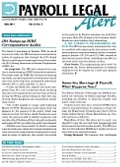Direct deposit was once novel. To encourage employees to sign up for checkless paydays, the federal government declared May direct deposit month. As government declarations go, it’s been a success—most employees do have their pay deposited directly into their bank accounts.
Most isn’t all, however. Remember, some employees don’t even have bank accounts. For employees in that latter category, plastic paycards are an answer. Or maybe not.
Direct deposit can squash check fraud. The art (and crime) of check kiting hasn’t gone away. Then there’s identity theft, which flourishes with easy-to-duplicate checks and color copiers, and which can spook even employees who signed up for direct deposit. Finally, most state laws still prohibit you from making direct deposit mandatory.
• WHAT WORKS: These developments force you to use expensive fraud-proof checks. While you can’t eliminate paper checks altogether, the fewer you use, the better your bottom line. NACHA, the electronic payments organization that represents banks, has a website full of ideas you can use to coax resistant employees. Point your browser to http://tinyurl.com/directdeposithelp for more information. For new hires, a time-tested technique is to include electronic pay enrollment forms as part of their routine intake paperwork.
Find and fix direct deposit errors. Employees won’t buy into direct deposit if repeated mistakes hinder their ability to reach their money. You can avoid the most common problem—employees’ pay isn’t deposited—by taking these three simple steps:
- Have employees provide you with voided checks when they enroll; deposit slips won’t do.
- Double check that the surnames on employees’ accounts match their names as they appear in your payroll and personnel records.
- Remind employees to notify you immediately if they change direct-deposit-linked banks or accounts.
Fixing other errors is more complicated, however. These errors are called reversals because they require you to ask your bank to reverse the electronic transaction. Reversals can occur when an employee is terminated after the direct deposit file is sent to the bank, and state law mandates immediate payment of final pay. Reversals may also be necessary if an incorrect amount or duplicate amount was deposited.
These rules apply to reversals:
- Reversals must be originated within five banking days of the settlement of the original (and erroneous) settlement and within 24 hours of when the error was discovered. Employees must generally be notified of a reversal.
- If employees have already withdrawn their funds, their banks don’t have to comply with reversal requests. It now becomes more cumbersome to get your money back. You might, for example, have to sue employees.
- If the mistake is an overpayment or underpayment of wages, don’t ask for a partial reversal. Partial reversals don’t comply with NACHA rules. In addition, reversals must comply with state wage-payment laws. Many states (Oregon, for example) consider a partial reversal to be an illegal deduction from wages. You must reverse the whole transaction and start again.
Paycards. The paycards that are advertised on TV exhort employees to bring them to their Payroll departments.
Upshot: You’ll have to deal with paycards from many vendors. It also means that you don’t control these paycards’ features—where employees may use them to cash out their pay (i.e., at ATMs or terminals at stores) and whether fees apply. This latter consideration is key, since most state laws mandate that employees can’t be charged a fee to withdraw their entire net pay in one transaction. Depending on the paycard vendor, you may be left holding the bag.
You may, however, be able to negotiate a better deal, including a fee waiver, with one paycard vendor. Of course, employees will have to give up their current paycards.
What you should look for: no-frills bank accounts, courtesy checks employees can use at a bank to cash out their net pay and online bill-paying.
• STATE LAW CHECKUP: As we said, state laws usually require that employee participation in direct deposit or paycard programs must be voluntary. States may also allow paycard vendors to charge employees fees, beginning with the second transaction. View a chart that summarizes the states’ direct deposit/paycard rules. “Mandatory” means that a state allows you to make e-payment a condition of employment, if you choose. States that don’t have laws aren’t included. In all cases, contact your state labor department for the full story.

